After 20 minutes of arguing with various Irish airline customer service reps, my wife, Emily, slammed her fist into a pillow and hung up. She turned and shook her head, but I already knew from my own fruitless attempts earlier. We weren’t going to get a refund on our tickets, and new flights back to the U.S. with one day’s notice would cost more than our checking and savings accounts contained.
Our poor planning had caught up with us. We had no idea how we were going to get home the next day, but we first had to get dressed for the wedding that started in a few minutes downstairs in a 400-year-old Welsh manor house owned by the British royal family. I fought the urge to panic, trying to quell the dread fluttering in my stomach.
“Let’s just deal with it later,” I said, straightening my necktie. “We don’t know what we’re doing. Maybe someone here can help us navigate our way back.”
Emily agreed. We did our best not to think about it, to live in the moment.
Related: 10 Ways Successful People Stay Calm
Here’s what we were telling ourselves not to think about: In our haste, we’d booked a nonrefundable late-morning flight the day after the wedding, assuming we’d be able to wake up early and hustle to the airport to get home in time for Emily to make it to work on Monday. I say haste because, while making those travel plans, we in no way accounted for how far North Wales is from the airport in Dublin. Now that we’d made the journey in one direction, we knew how mistaken we’d been.
To get to this incredibly elegant, intimate, remember-it-until-we-die wedding, we’d flown across the Atlantic Ocean, into the Dublin airport. After a night in Dublin, we took a two-hour ferry ride across the Irish Sea to Holyhead at the northernmost tip of Wales, then a 30-minute train ride, then a 30-minute bus ride, then a 10-minute cab ride. Literally a plane, a train, an automobile and a boat.
As it happened, there was a late-night ferry leaving Holyhead on the night of the wedding. But we did the time calculations, and we would have had to leave the wedding right after dinner and somehow get a cab in the middle of the countryside late on a Saturday night—and even that would have been cutting it close. Later we’d learn that this late-night ferry was a rare event, only crossing toward Dublin because of a big Gaelic football match the next day.
Looking back, that ferry might have been a gift from the ancient Celtic gods. We foolishly declined.
***
When we told our friends at the wedding our plan to “just wing it” home the next day, we got some curious looks. But we’d mostly been winging it since we left home—figuring out where we’d go and how we’d get around on the fly—and so far we’d had a wonderful trip.
In Dublin, people were even kinder than I expected. The bartender at our hotel not only recommended a neighborhood we should check out, but drove us there after her shift ended, insisting that it wasn’t too far out of her way. She dropped us off at a corner and waved off the 5 euro note we offered for petrol, apologizing to us that our visit coincided with a bus workers’ union strike.
We bounced from pub to pub meeting ruddy-faced, blustering, boastful barflies who seemed determined to embody every Irish stereotype. The only thing anyone took seriously was pouring a perfect pint of Guinness. Every bartender claimed to be the best, that other pubs took unforgivable shortcuts like not clearing the draft lines daily or even cleaning pint glasses in the same dishwasher used for teacups and butter plates. The regulars at each new stop assured us we’d finally found it, the premier Dublin pub. At one, we spent a couple of hours talking with a blind man who tapped a coin against his glass every time he was handed a fresh pint and taught us to listen to the clinks until we heard the timbre that indicated the pint had settled and was ready to drink.
Related: The Real Reason Traveling Makes You Happy
Making our way from Dublin to Wales, we serendipitously ran into a friend on her way to the same wedding. Together we managed to miss a train stop; flag down another train headed back the way we’d come from; pass through the town whose name is the longest in Europe (commonly shortened mercifully to Llanfair PG); miss our cab; and still somehow make it to the rehearsal dinner on time. Then just hours before the wedding, we’d toured the brutish Caernarfon Castle, bristling with cannons and pocked with archer slits and murder holes, and just happened to arrive the morning after a gigantic dragon’s head mysteriously appeared in the town square.
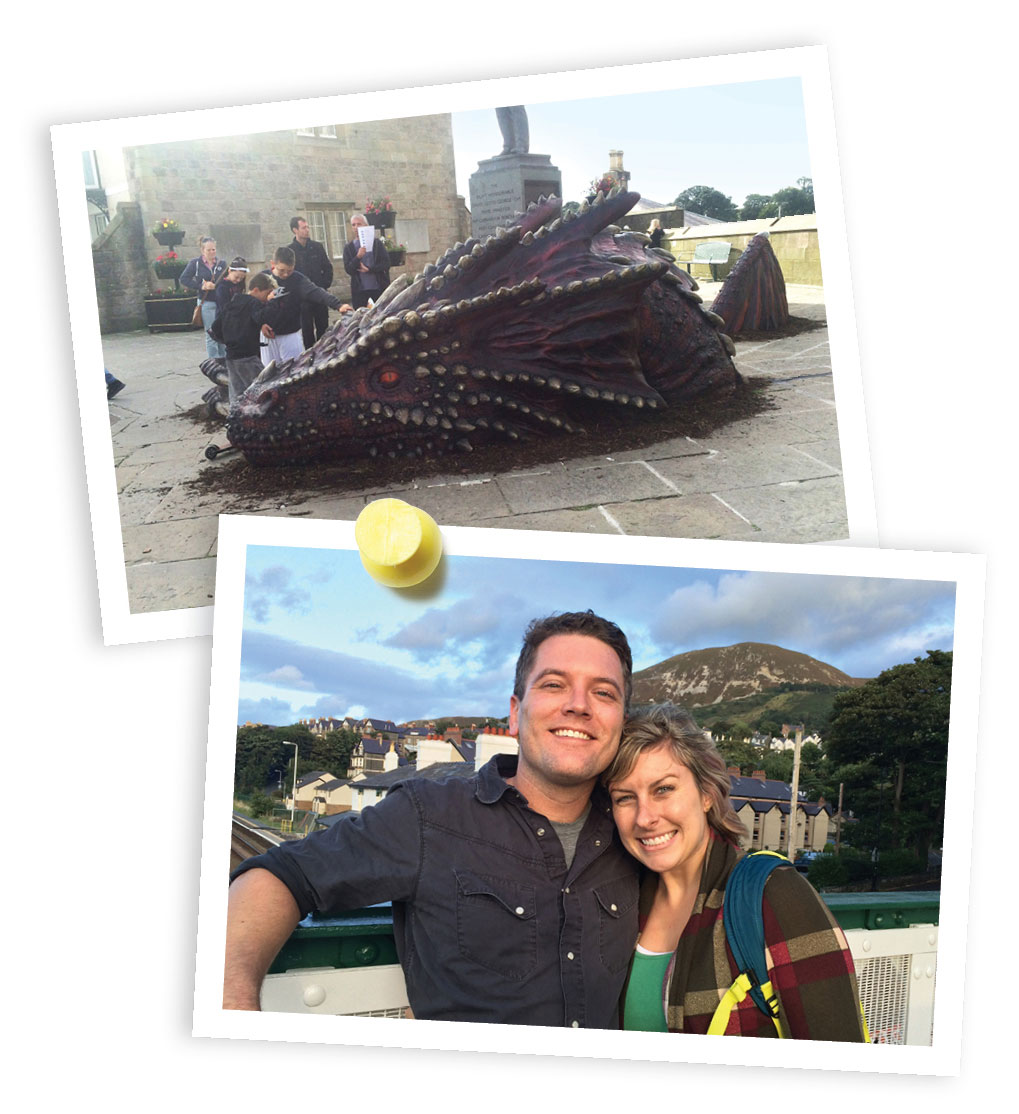
There was something about that wonderful land of magic and dragons that made us want to cast our fate to the winds.
***
If we had been realistic, we wouldn’t have planned on leaving the morning after the wedding, with no room for error on an itinerary that required five different forms of transportation for each leg. Obviously. But if we had applied cold reasoning to our travel plans, we wouldn’t even be there.
In the months leading up to the wedding, we debated whether we’d go. We knew our budget and limited vacation days meant we shouldn’t. The bride and groom assured us that they wouldn’t be offended if we didn’t want to spend the giant chunk of cash and time a trip like that would take, that there would be a domestic party where we’d celebrate. But it also sounded like a once-in-a-lifetime opportunity. Not only would we get to see two of our closest friends get married, we’d also see a part of the world we’d both always wanted to visit.
We were now subsisting completely on the will of people we’d never met and would never would see again.
One rash night, after the groom informed me a family member’s cancellation left an unoccupied and cost-free room at the manor house up for grabs, we talked ourselves into it: We’d cut back our expenses till then, shorten our itinerary to get home the day after the nuptials, put the trip on our credit card and pay it off later. Still warm from the afterglow of our own nuptials a few months earlier, we were nervous, but it was exciting to take such a crazy leap together. We probably should have looked at a map.
By the time we got to the site of the wedding, though, we had no regrets. The manor had a deep royal blue carpet and centuries-old paintings in ornate gilded frames. The gentle rolling emerald hills behind the property were spotted with black cattle and puffy white sheep.
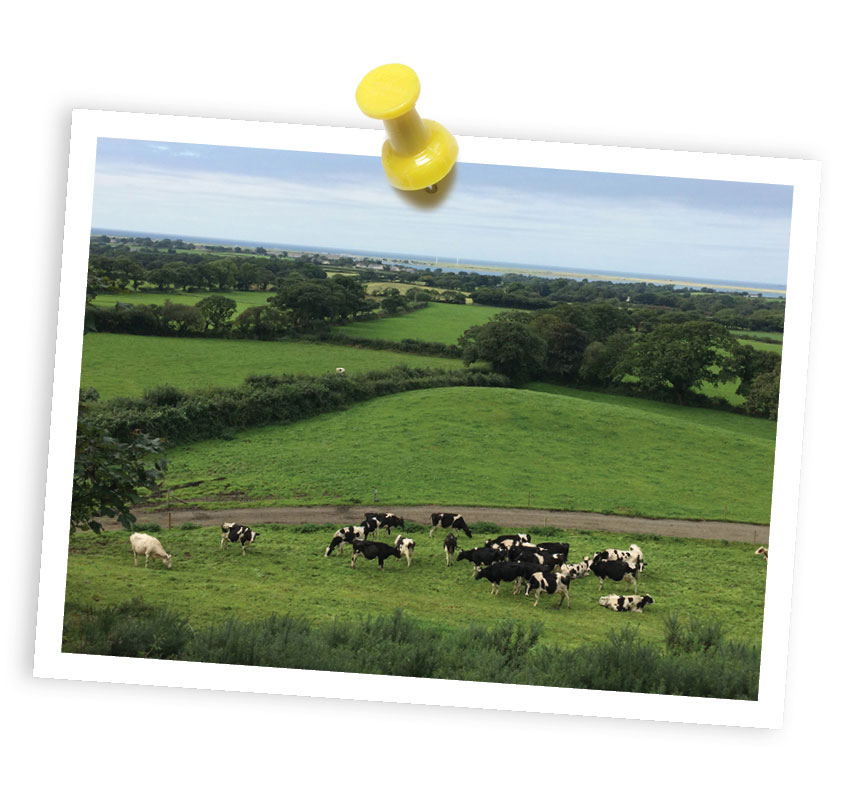
The wedding was fairy tale pretty. When the couple recited their sweet, strange and perfect vows, my wife and I squeezed each other’s hands. Afterward we had one of the fanciest meals either of us has ever enjoyed, complete with champagne sorbet palate cleanser between courses. We drank expensive wine and whiskey surrounded by antiques, globes, ivory chessboards and mirrors. We’d never felt so aristocratic.
***
In the sober morning, we ate breakfast and packed without rush. Emily and I would ride with the newlyweds to their next stop, and from there make our way to Dublin. But when we used the manor’s Wi-Fi to search for later flights out of Dublin, everything within our price range was booked.
We had no plan when the cab pulled up. It turned out the bride and groom knew the driver. Mark, a natural-born fixer type of about 50, had already helped various people in the wedding party out of different jams earlier that week. He was maybe 400 pounds, shaped like a bowling ball with hands like canned hams studded with cigar-butt fingers and an array of tattoos. He tossed our luggage into the van and asked my wife and me where we needed to be dropped off. We explained our situation as he drove, and he laughed at us.
“I guess take us to a train station so we can get to the London airport,” I said. We were about three hours away—roughly the same distance from the Dublin airport if you count boat time—and I figured there might be more options for flights home.
“Why would you want to go to London?” he asked. (This is a rough approximation of what he said, as an exact quote would contain more profanities than SUCCESS has printed in the publication’s history.) “They had a train derailment. A landslide shoved a train off its track, into another train. Miracle only two people were hurt. It’s all off-schedule. Why not Manchester?”
“Because I have no clue where that is and didn’t know it had an airport” would have been the truthful reply, but instead I said, “That’s a good idea.”
Mark seemed to find us amusing, if nothing else. It was a two-hour ride to Manchester, and he was bored on a Sunday afternoon, so he agreed to drive us there for about the price of two last-second train tickets. On the way to our friends’ honeymoon hotel, we wanted to stop at a scenic lookout on the Menai Bridge, and Mark volunteered to take pictures for us.
We got to Anglesey, where the bride and groom were staying for the night.
“All right, man, let me know how it goes,” the groom said as we let them out. “We’re curious to hear how this turns out.”
“Sure thing.”
“I don’t mean just us,” he clarified. “I mean everyone at the wedding was talking about it, like, ‘What’s going to happen to Jesse and Emily? Do they even have a plan at all?’ ”
***
As we drove, Emily and I kept searching for flights, cursing our lousy cell service. Finally, Mark called someone on his own phone.
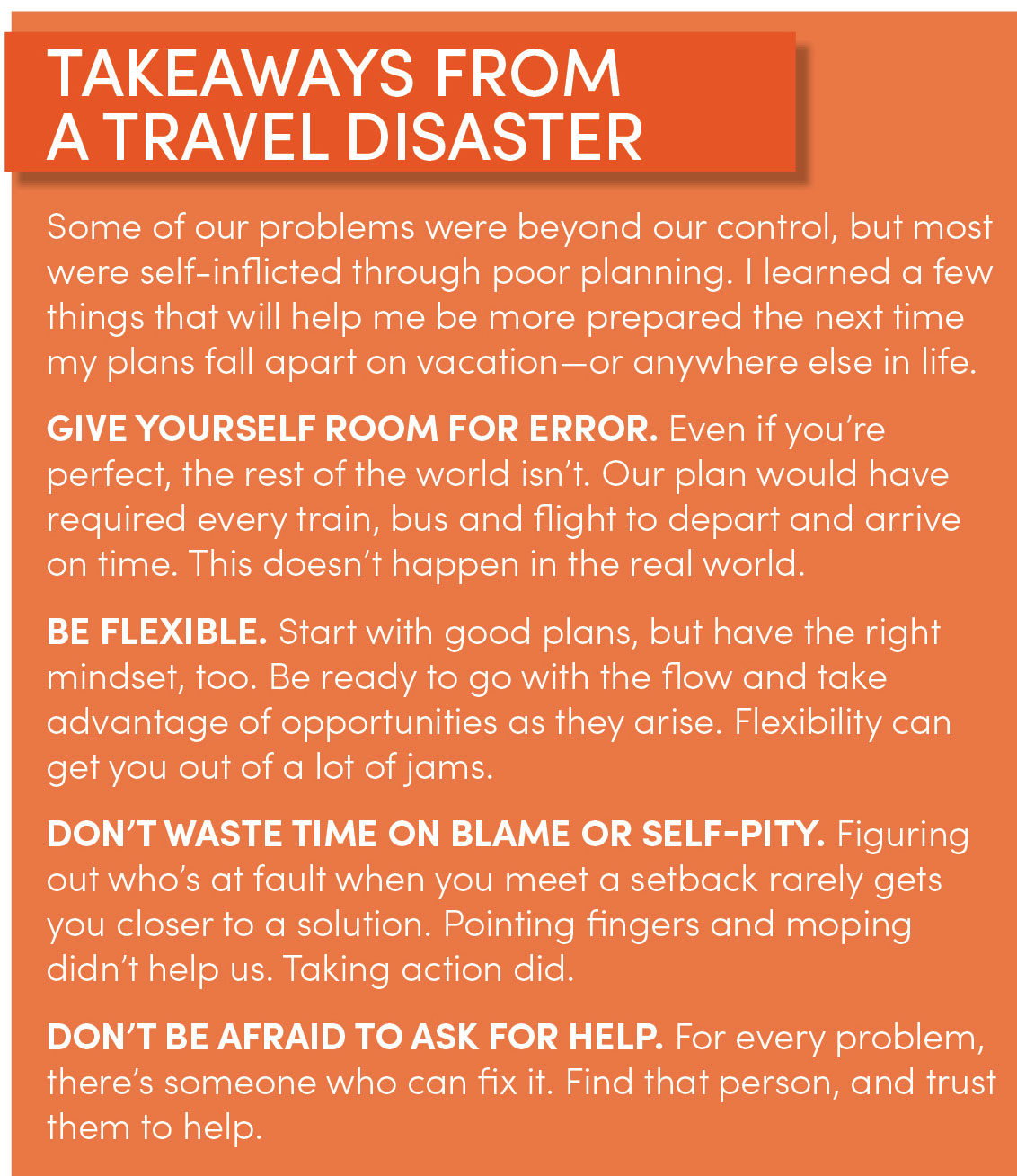
“Mum!” he said when the other party answered. “I need you to look something up on the iPad.” He waited a moment. “OK, you’ve got to turn it on first. The power button is—yes, that’s it.”
Then Mark, our new best friend, talked his mother through the process of using Google, apparently for the first time, to find available flights. It was pretty clear by now that we weren’t going to get home that night, and that we’d be missing work the next day. Accepting that fact was a strange and unexpected relief. We agreed we’d both beg our respective bosses for forgiveness when we got back. It would be fine. Then we realized that with all the connections and layovers we were looking at, it would actually be Tuesday night before we’d get home and we’d have to miss two days of work. We both sighed and shrugged.
Listing flight numbers for the next morning, Mark apologized that they weren’t cheaper, but after the hours we’d already spent searching for flights out of Dublin and London, we were astonished they’d found anything at all. He handed his own smartphone over to let us book a flight, then a room at a cheap chain hotel near the airport. We had to put it all on our credit card, not something either of us felt good about, but we told each other that would be fine, too.
When we got to our hotel, I was 20 pounds short of the fee we’d agreed to, so Mark waited with Emily and unloaded the van while I ran inside to find an ATM. Fittingly, the lone cash machine was out of order. Feeling helpless and blindsided by my own mistakes was becoming tiresome. Why didn’t I get cash earlier when we’d stopped for snacks?
“You’re kidding!” he said when I told him, then shook his head. “I don’t know why I’m surprised.”
I had a few euro coins and a $20 U.S. bill in my billfold—still the equivalent of about 5 pounds short—but I offered it all. He opted for the euros, saying he had no use for American money. I think he sensed that, at this point, we needed every dime we could spare.
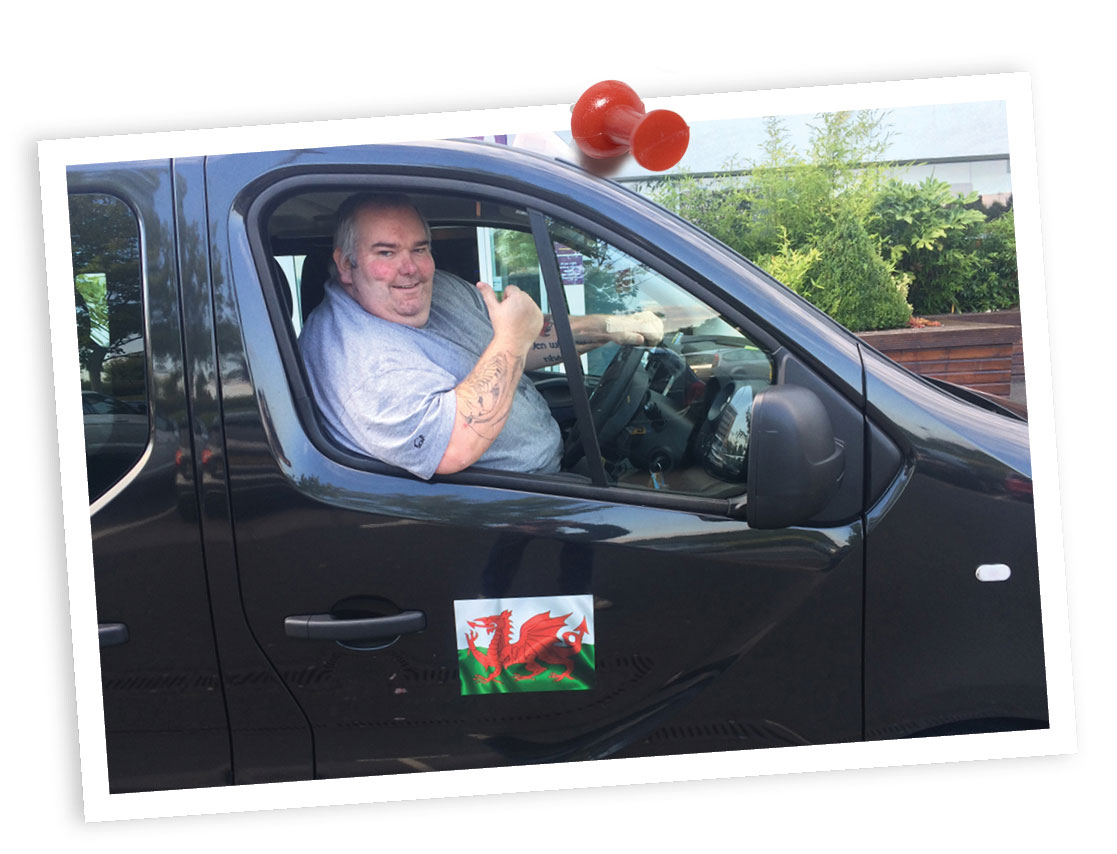
That night we were too tired to leave the hotel, and by the time Emily and I decided we were hungry, the restaurant downstairs was closing. We must have looked as beleaguered as we felt, because the waitress took pity and kept the place open just a little longer for us. We were now subsisting completely on the will of people we’d never met and would never would see again.
Related: I Drove for Uber to See How Strangers Can Impact My Life
***
From Manchester we flew to New York City, where we had a daylong layover. It could have been terrible—more money blown on food and a hotel, more lugging our suitcases around bleary-eyed and exhausted—but we decided to think of the night as a chance for another mini-vacation. Emily had never been to New York, and with the credit card bills we were racking up, we knew we probably wouldn’t be traveling again anytime soon.
I texted the only person I knew in town, an old work friend who’d relocated to the city. She was preparing for a trip of her own the next morning and couldn’t join us but stopped packing long enough to offer non-touristy to-do suggestions and give us a few options of places to eat in Queens, where we were staying. Sure enough, the Taiwanese place we picked from the list was cheap yet outstanding, especially the “hamberger” that looked like someone in the kitchen read a vague description of the classic American sandwich and recreated it with pork belly, pickled vegetables, steamed buns and whatever else was on hand. Our waitress was shocked and delighted at how much I ate. I’d been feeling glum, berating myself for how off-the-rails the trip had gone, and silly as it was, the server’s proud astonishment cheered me up.
As night fell, we walked through the pocket of Asian restaurants and bodegas and produce markets looking for a subway station, block after block, until the sidewalks were mostly empty. Nervous and lost, we kept going with the assumption we’d eventually hit something—a subway station, a cool store where we could buy souvenirs for the kids, some historic site—but it was just auto repair shops and payday lenders. An elderly man wearing amber sunglasses despite the darkness turned a corner and headed toward us, his hand leashed to a beige dust-mop head with eyes.
“Can I pet your dog?” Emily asked.
The old guy with a comically exaggerated Queens accent seemed delighted to have people to talk to, and it was evident he had nowhere else he needed to be after a half hour, then 45 minutes, went by, him going on about dogs, obedience training and how smart his stupid-looking Pekingese was.
We finally parted ways and took a Lyft into Manhattan. Coming over the 59th Street Bridge, the city sparkled ahead of us in the dark, like gems strung onto impossibly tall towers. It was even more impressive than we expected. Surrounded by spectacular skyscrapers and the signs and landmarks we’d seen a thousand times during Saturday Night Live’s opening credits, we forgot about our little arguments and aching feet and bank balance. It was another nice moment we just happened to share with another stranger helping us on our journey.
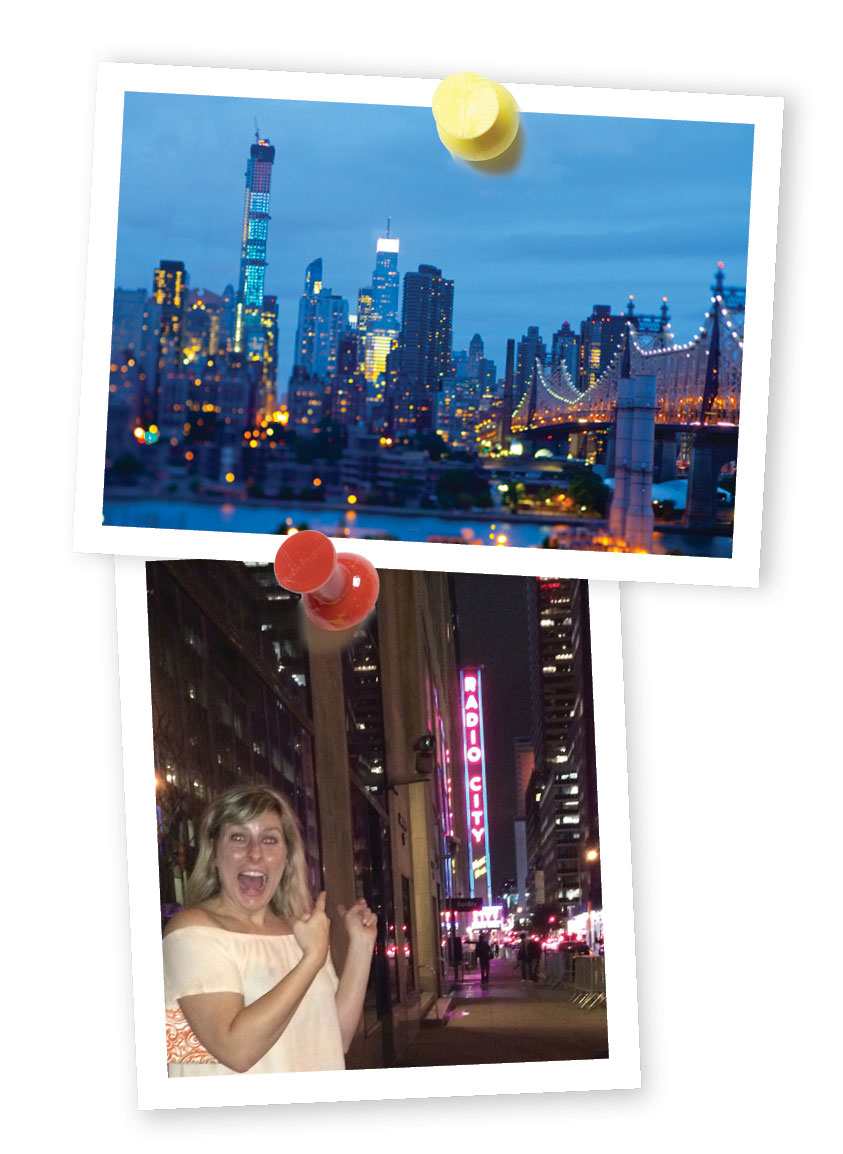
The next day we flew to Boston, then back home without further mishaps. Emily didn’t get any grief at work about overstaying her vacation, and the kids had made sure our dogs didn’t miss any meals or destroy the house.
It took about a year to pay off the credit card debt our poor planning added up to. Now though, when we look at photos from the trip, we see smiles and good times. What was ridiculously stressful in the moment is funny now. And when we think about the trip, we think about the beautiful memories we made with some of our closest friends. But we also think about the new friends we met on that long, crazy road home: the boisterous cabbies, the merciful waitresses, the strangers we had great conversations with, the kind people who could have made our situation terrible but instead made it something we’ll cherish forever.
If we had applied cold reasoning to our travel plans, we wouldn’t even be there.
A few nights ago, we were visiting with the married couple and another friend who’d gone to their wedding when the conversation turned to Wales.
“I’d love to go back,” Emily said wistfully as we reminisced. “Except I’d plan our trip a little better next time.”
Related: 29 Beautiful Stories That Will Restore Your Faith in Humanity
This article originally appeared in the November 2017 issue of SUCCESS magazine.

